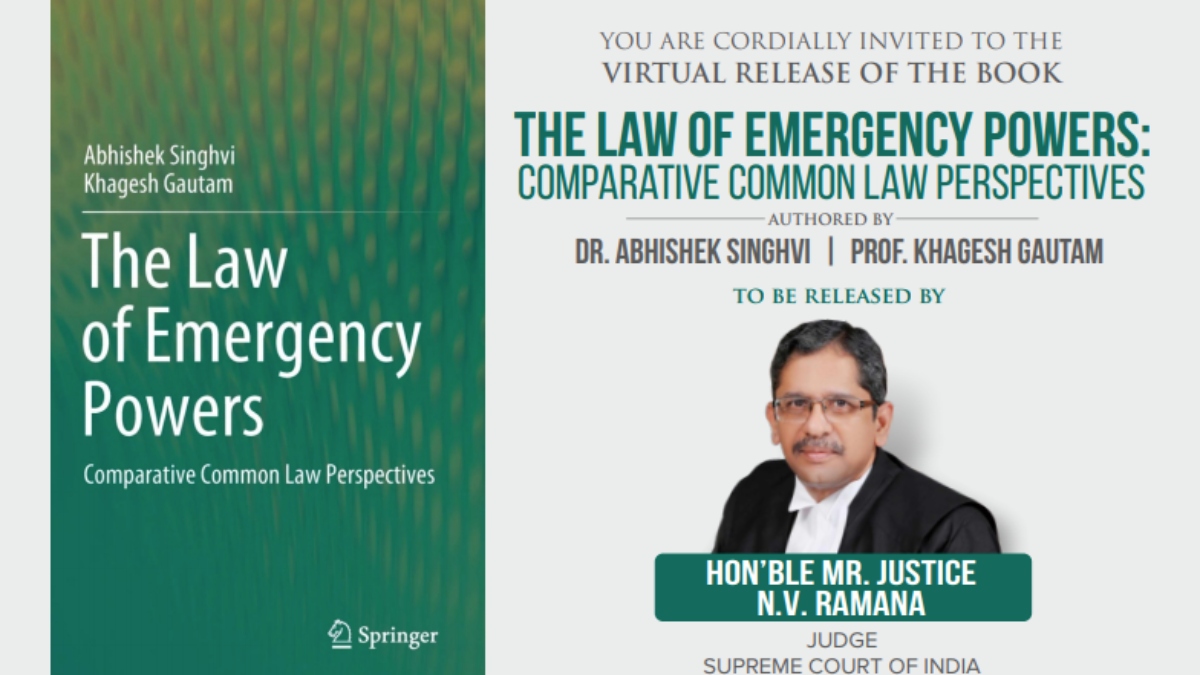


Hon’ble Mr. Justice N.V. Ramanna will be launching the book titled “The Law of Emergency Powers: Comparative Common Law Perspectives written by Dr. Abhishek Singhvi and Prof. Khagesh Gautam on 23rd January, 2021, i.e tomorrow. Published by Springer, the book will be launched virtually at 4:30 PM tomorrow. Hon’ble Mr. Justice Surya Kant, Hon’ble Mr. Justice Sanjay Kishan Kaul and Hon’ble Dr. Justice D. Y. Chandrachud of the Supreme Court will speak as guests of honor at the event.
The Law of Emergency Powers: Comparative Common Law Perspectives presents a comprehensive legal and constitutional study of emergency powers from a comparative common law perspective. The book explores in detail various emergency powers, statutory and common law, constitutional and statutory law, martial law and military acting-in-aid of civil authority, wartime and peacetime invocations, and several related and vital themes like judicial review of emergency powers. It is a comparative study on the three jurisdictions which consist of the pure implied common law model (employed by the UK), implied constitutional model (employed by the USA) and the explicit constitutional model (employed by India).
The book also covers the various positions on external emergencies as opposed to internal emergencies, economic/financial emergencies, and emergent inroads being made into state autonomy by the central or federal governments, through use of powers like Article 356 of the Indian Constitution.
The book has been endorsed by many eminent scholars and jurists including Professor Philip Allott, Professor Emeritus of International Public Law, Cambridge University, UK; Professor (Dr). Upendra Baxi, Professor of Law, Jindal Global Law School, O.P. Jindal Global University, Sonipat, India; Emeritus Professor of Law, University of Warwick, Coventry, U.K.; Former Vice Chancellor, University of Delhi, India, Professor Sital Kalantry, Clinical Professor of Law & Faculty Director, Cornell India Law Center, Cornell Law School, USA, Justice R.C. Lahoti, Former Chief Justice of India, Justice R.M. Lodha, Former Chief Justice of India, Professor (Dr.) Stephen P. Marks, François-Xavier Bagnoud Professor of Health and Human Rights, Harvard University, Cambridge, U.S.A.; Member, Committee on Human Rights in Times of Emergency, International Law Association, Professor (Dr.) Nathaniel Persily, James B. McClatchy, Professor of Law, Stanford Law School, Stanford University, USA, Justice M.N. Venkatachaliah, Former Chief Justice of India and Professor David B. Wilkins, Lester Kissel Professor of Law, Vice Dean for Global Initiatives on the Legal Profession & Faculty Director of the Center on the Legal Profession, Harvard Law School, Harvard University, USA.